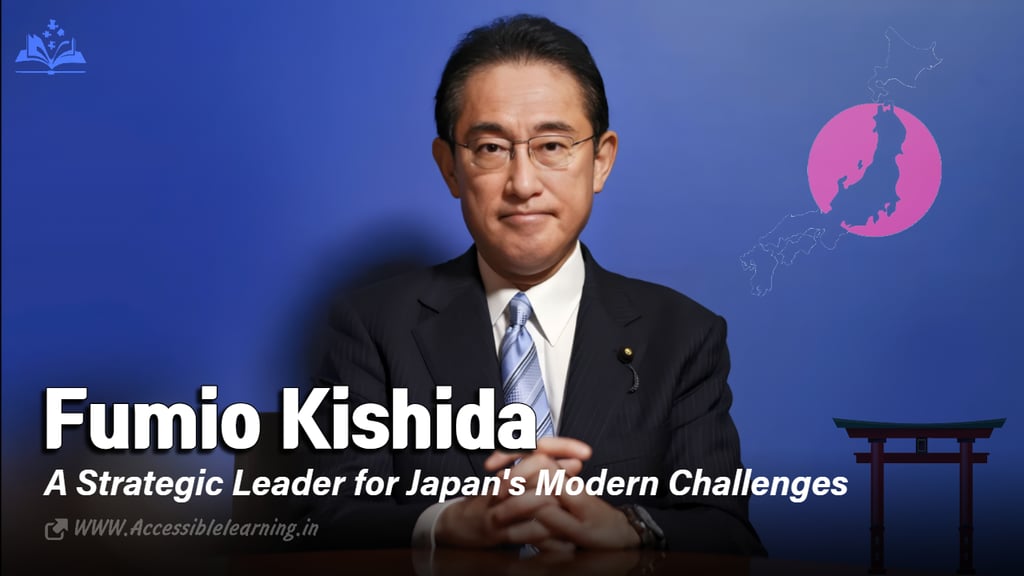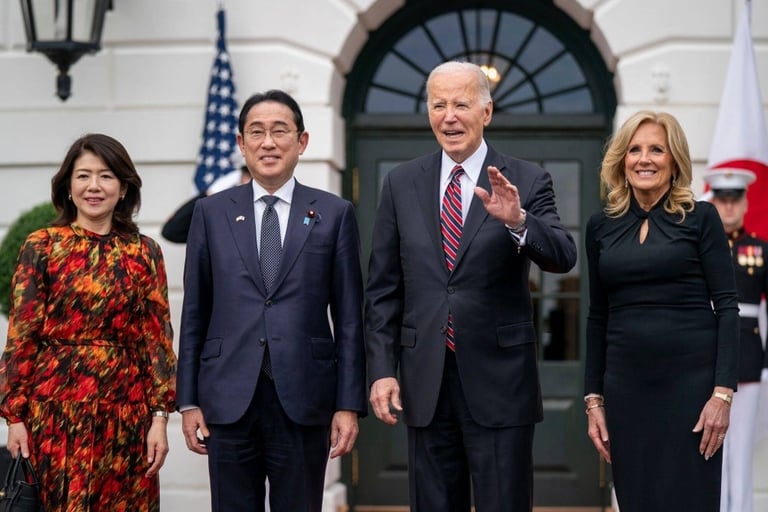
Fumio Kishida: A Strategic Leader for Japan's Modern Challenges!?
Explore the life, leadership, and policies of Fumio Kishida, Japan's Prime Minister. From his Hiroshima roots to his 'new capitalism' vision and global diplomacy, discover how Kishida is shaping Japan's future in an evolving world.
JAPANBIOGRAPHYTHE GREAT LEADERPOLITICAL JOURNEY
Sachin K Chaurasiya
11/18/20246 min read


Fumio Kishida, the 100th Prime Minister of Japan, is a seasoned diplomat and political strategist whose leadership comes at a pivotal time in both domestic and international arenas. Known for his calm demeanor, pragmatic policies, and long-standing affiliation with the Liberal Democratic Party (LDP), Kishida represents continuity and reform. His tenure has seen challenges ranging from geopolitical tensions to economic recovery in a post-pandemic world.
This article explores Kishida's background, political journey, leadership style, and the impact of his governance on Japan's socio-economic landscape.
Early Life and Education
Fumio Kishida was born on July 29, 1957, in Hiroshima, a city marked by its tragic history during World War II. This connection to Hiroshima profoundly influenced his political philosophy, especially his advocacy for nuclear disarmament.
Kishida’s family had strong political roots. His father and grandfather were politicians, which exposed him early to the intricacies of governance. He pursued his education at Waseda University, graduating with a law degree in 1982. After graduation, Kishida worked in finance in the United States, gaining international exposure that later shaped his diplomatic outlook.
Political Career
Kishida entered politics in 1993, winning a seat in the House of Representatives. Over the years, he held several key positions, including:
Minister of Foreign Affairs (2012-2017): His tenure was one of the longest in Japan’s history, where he emphasized strengthening Japan's ties with the United States and other allies. He was instrumental in negotiating the 2015 Japan-South Korea agreement on "comfort women," showcasing his diplomatic acumen.
Chairman of the LDP Policy Research Council: This role allowed Kishida to shape the party's domestic and economic policies, earning him a reputation as a moderate within the conservative LDP.
Kishida’s steady rise in the party culminated in his election as Prime Minister in October 2021, succeeding Yoshihide Suga.
Leadership as Prime Minister
Domestic Policies
Kishida’s administration introduced the concept of a "new capitalism," aiming to address income disparities and create a more inclusive economy. His policies focus on redistributing wealth through wage hikes and supporting smaller businesses. Kishida has also prioritized digital transformation and green initiatives to modernize Japan’s economy.
Foreign Policy
Kishida’s foreign policy reflects his background as a former Foreign Minister. Key initiatives include:
Strengthening Alliances: Kishida has reinforced Japan's alliance with the United States, particularly in the face of rising tensions with China and North Korea. He has also advocated for a free and open Indo-Pacific.
Focus on Security: With growing regional instability, Kishida announced plans to increase defense spending and modernize Japan's self-defense forces.
Advocacy for Nuclear Disarmament: Coming from Hiroshima, Kishida has been a vocal proponent of nuclear disarmament, participating actively in global forums.
Crisis Management
Kishida faced significant challenges, including managing Japan’s post-pandemic recovery, addressing inflation, and navigating energy shortages exacerbated by the Ukraine crisis. His response has been measured, with policies aimed at stabilizing the economy while investing in renewable energy sources.
Leadership Style
Kishida is often described as a consensus-builder, preferring dialogue and careful consideration over abrupt decisions. His leadership style contrasts with that of his predecessors, such as Shinzo Abe, who were more assertive. This approach has garnered both praise and criticism; while some appreciate his thoughtful strategies, others argue for more decisive action in pressing matters.
Challenges and Criticism
Kishida’s tenure has not been without hurdles. His administration faces criticism for its slow progress on certain reforms, such as gender equality and immigration policies. Additionally, his approach to revising Japan’s pacifist constitution has sparked debates both domestically and internationally.


Family and Personal Life
Fumio Kishida is known for his approachable and humble personality. He is married to Yuko Kishida, and the couple has three sons. Despite his high-profile career, Kishida maintains a low public profile about his family life, focusing on his duties and the larger political landscape. His personal connection to Hiroshima deeply influences his worldview, particularly his dedication to advocating for peace and nuclear disarmament.
Kishida’s “New Capitalism” in Detail
Kishida’s economic vision, dubbed “new capitalism,” seeks to address systemic inequalities in Japan’s economy while fostering innovation. This policy contrasts with the previous “Abenomics” approach, which focused on monetary easing and large-scale corporate benefits. The core elements of Kishida’s plan include:
Income Redistribution: Encouraging companies to increase wages for workers to stimulate consumer spending and reduce income disparities.
Support for Startups: Boosting investments in emerging businesses and technological innovation to strengthen Japan’s competitiveness.
Environmental Goals: Pushing for carbon neutrality by 2050 with investments in green energy technologies and infrastructure.
While the plan has generated optimism, critics argue that implementation will require more aggressive measures to achieve tangible results.
Key Achievements as Foreign Minister!
During his tenure as Foreign Minister, Kishida was instrumental in shaping Japan's modern diplomatic strategies. Notable accomplishments include:
Japan-South Korea Comfort Women Agreement (2015): Kishida played a central role in this historic agreement, which aimed to resolve long-standing grievances between the two nations over Japan's actions during World War II.
Strengthening U.S.-Japan Relations: Kishida worked closely with the United States to bolster military and economic ties, positioning Japan as a key ally in the Asia-Pacific region.
Engagement in Multilateral Diplomacy: He represented Japan in major international summits, emphasizing Japan’s role in global peace and stability.
Focus on Japan’s Security and Defense
Under Kishida’s leadership, Japan has adopted a more assertive security posture in response to evolving threats in the Asia-Pacific region, particularly from North Korea’s missile tests and China’s military assertiveness. Key measures include:
Increased Defense Budget: Kishida has pledged to raise defense spending to 2% of Japan’s GDP, aligning it with NATO standards.
Strengthened Military Capabilities: Plans include modernizing Japan’s Self-Defense Forces, focusing on cyber warfare, missile defense, and space security.
Deepened Quad Alliance Cooperation: Kishida has emphasized collaboration with the United States, Australia, and India through the Quadrilateral Security Dialogue (Quad) to maintain regional stability.
Geopolitical Stance and Challenges!
Kishida's foreign policy strategy balances maintaining strong alliances while navigating complex relations with neighboring countries:
China: While advocating for a stable relationship, Kishida has expressed concerns over Beijing’s actions in the South China Sea and Taiwan Strait.
North Korea: Kishida has called for denuclearization on the Korean Peninsula, reinforcing Japan’s readiness to address security threats.
Russia: Following the Ukraine conflict, Kishida has supported sanctions against Russia while seeking alternative energy sources to reduce Japan’s reliance on Russian imports.
Response to Domestic and Global Crises!
COVID-19 Pandemic Recovery: Kishida focused on accelerating vaccine rollouts, expanding healthcare infrastructure, and supporting businesses through financial aid packages.
Energy and Climate Crisis: Rising energy costs, exacerbated by the Russia-Ukraine war, have pushed Kishida to diversify energy sources, including investments in nuclear power and renewables.
Aging Population and Workforce: Japan’s aging society poses significant challenges. Kishida has called for policies encouraging higher birth rates, immigration reforms, and improved elderly care systems to address this demographic shift.
Global Leadership on Peace and Disarmament?
Kishida’s Hiroshima roots have made him a vocal advocate for nuclear disarmament. His leadership in this domain includes:
Hosting the Hiroshima G7 Summit in 2023, where he pushed for commitments toward global nuclear reduction.
Spearheading efforts within the United Nations Conference on Disarmament to promote non-proliferation treaties.


Controversies and Criticism!?
Despite his achievements, Kishida has faced criticism on various fronts:
Slow Economic Reforms: Some critics argue that his “new capitalism” lacks concrete measures to drive significant change.
LDP Scandals: The ruling Liberal Democratic Party has faced allegations of corruption and ties with controversial organizations, creating challenges for Kishida’s image.
Gender Equality Concerns: Japan continues to lag in gender parity rankings, and Kishida’s administration has been criticized for insufficient progress on women’s empowerment in politics and business.
Public Perception and Future Outlook!
While Kishida is often seen as a stabilizing figure, public opinion has fluctuated based on his handling of crises and policy execution. His ability to deliver on key promises will likely determine his legacy as Prime Minister. As Japan navigates an uncertain global landscape, Kishida’s leadership remains crucial in steering the nation toward resilience and prosperity.
Vision for Japan
Fumio Kishida envisions a Japan that is resilient, innovative, and influential on the global stage. His policies aim to balance tradition with modernization, ensuring that Japan remains competitive in a rapidly changing world.
Fumio Kishida stands as a pivotal figure in Japanese politics, steering the nation through complex domestic and international landscapes. His commitment to diplomacy, economic reform, and global peace positions him as a leader who blends pragmatics with a vision for the future. While challenges remain, Kishida's measured approach and dedication to his principles reflect a leader intent on shaping a brighter path for Japan.
Subscribe To Our Newsletter
All © Copyright reserved by Accessible-Learning Hub
| Terms & Conditions
Knowledge is power. Learn with Us. 📚


